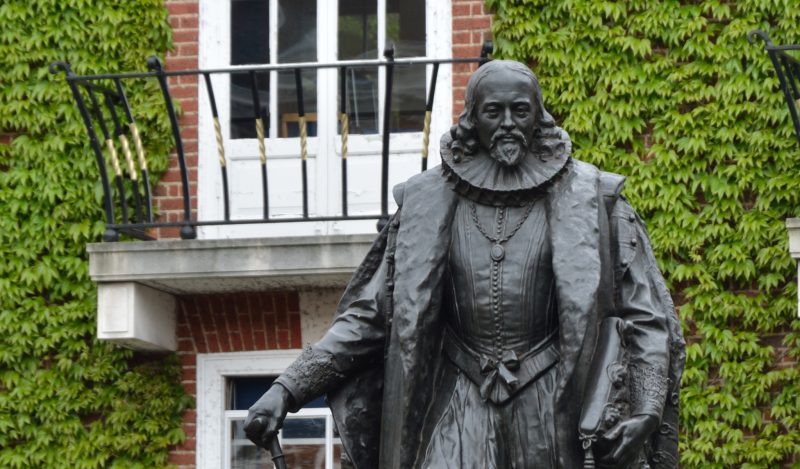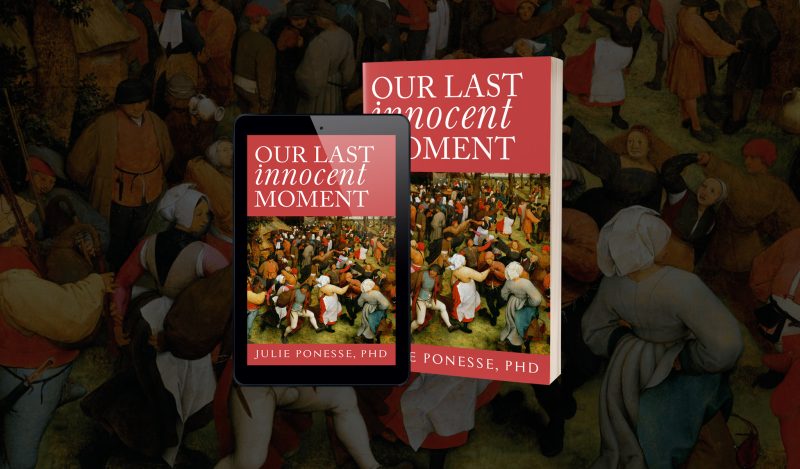Suppose that after all the various scientific experts and authorities had finished lecturing the public from their TV pulpits, someone had stood up and said this:
“They who have presumed to dogmatize on nature, as on some well-investigated subject, either from self-conceit or arrogance, and in the professorial style, have inflicted the greatest injury on philosophy and the sciences.
For they have tended to stifle and interrupt inquiry exactly in proportion as they have prevailed in bringing others to their opinion: and their own activity has not counterbalanced the mischief they have occasioned by corrupting and destroying that of others.”
Imagine the reaction. If they were on a video link they’d be cut. If they were in the room they’d be thrown out.
Saying something like that would be unacceptable under any circumstances. Whether it came from a member of the panel on a show like the BBC’s ‘Question Time’, a member of the public on a phone in show like Jeremy Vine or an expert on a News programme, the reaction would be the same.
After a moment of stunned silence and dumb disbelief, the initial shock-horror would give way to outrage. If they weren’t immediately closed down they’d be debunked, discredited and shouted down in seconds.
Even if a TV channel were willing to risk broadcasting something so controversial in the hope of upping their ratings, they’d be breaking Emergency Regulations introduced at the beginning of the Covid pandemic. Trying to do it on Social Media would be even worse.
Which is ironic because the speaker would be quoting verbatim from the opening passage of a 1902 edition of ‘Novum Organum’ by Sir Francis Bacon, the guiding spirit behind the world’s first national scientific institution, The Royal Society, and the father of The Scientific Revolution. ‘Novum Organum’ laid the foundations of the Scientific Method exactly 400 years before the Plague Year of 2020.
If Bacon had been closed down in 1620, as he would be today, the Scientific Revolution could never have happened.
It’s Science Jim, But Not As We Know It
The difficulty the public, and even many scientists these days, would have in understanding what Bacon is saying is that his kind of science is very different to the kind of ‘settled consensus’ science that’s taught in schools and presented in the mainstream media by celebrity scientists like Richard Dawkins, Brian Cox or David Attenborough.
Bacon’s intention in writing Novum Organum wasn’t to argue with the consensus but simply to ignore it and get on with something more productive.
‘I’m not even slightly working to overthrow the science that is flourishing these days. I don’t put obstacles in the way of this accepted science. Let them go on doing what they have long done so well. Let them give philosophers something to argue about, provide decoration for speech, bring profit to teachers of rhetoric and civil servants!
Let me be frank about it. The science that I shall be advancing isn’t much use for any of those purposes. You can’t just pick it up as you go. It doesn’t fit with preconceived ideas in a way that would enable it to slide smoothly into the mind; and the vulgar won’t ever get hold of it except through its practical applications and its effects.’ (Novum Organum Preface, Bennett translation, 2017)
It’s the preconceived ideas about the applications and effects of science, presented to the ‘vulgar’ or lay public by the mainstream media that prevent Bacon’s kind of science from ‘sliding smoothly’ into the modern mind.
Just the use of the word ‘vulgar’ jars so badly with the modern mind it would be enough to get Bacon cancelled, even though in his time it referred to ‘commonplace’, ‘ordinary’, ‘run-of-the-mill’ people who don’t know much philosophy and have few intellectual interests.
Bacon says he isn’t working to overthrow the science that is flourishing these days but, as the Lord High Chancellor of England and top lawyer in the land, his acerbic barrister’s wit damns it with faint praise. Let all the experts and authorities go on discussing how many angels can dance on the head of a pin. Let them go on proving how clever they are with increasingly flowery and technical language. Let them continue to get rich by blinding the public with science.
Bacon’s method is no good for any of those things. You can’t just pick it up casually from TV, newspapers or social media. It doesn’t slide smoothly into the mind like advertising slogans or political rhetoric. The ordinary, run-of-the-mill TV viewer won’t ever understand it, except through the things it produces, like smart phones, cosmetics and vaccines. And, worst of all, it’s no use for making a profit!
Without going any further it’s clear that Bacon’s kind of science sounds more like something monks might do in the seclusion of their monasteries than celebrities might do on TV.
‘Our method, though difficult in its operation, is easily explained. It consists in determining the degrees of certainty, while we, as it were, restore the senses to their former rank, but generally reject that operation of the mind which follows close upon the senses, and open and establish a new and certain course for the mind from the first actual perceptions of the senses themselves.’ (Novum Organum, Preface, Wood translation, 1831)
Contrary to what the celebrity scientists might tell us, science isn’t a mountain of knowledge to be climbed, it’s a method to be practised. It isn’t hard to explain, it’s easy. And it doesn’t produce certainties, it’s a method for finding out how certain things are for ourselves.
But perhaps the most difficult thing for the modern mind to grasp is the kind of ‘sense’ Bacon is referring to when he talks about ‘restoring the senses to to their former rank’.
What’s in a Name?
The meaning of words evolves to reflect the values of the times. In the modern world, which values brains above brawn and academic qualifications above practical experience, the word ‘sense’ is interpreted almost exclusively in intellectual rather than practical terms.
‘Talking sense’ means talking rationally, ‘making sense’ means expressing thoughts logically, and ‘common sense’ means common opinions and judgements.
But what Bacon means by ‘sense’ is the original 14th century meaning of the word. In those days ‘the senses’ were the five bodily senses of sight, sound, touch, taste and smell, and ‘common sense’ was a common sensation in the heart linking the five senses, not common thoughts in the brain.
Bacon stood at the crossroads between the old and the new interpretations of ‘sense’. It would be another 20 years before the French mathematician and scientist, René Descartes, became the first Western philosopher to document the difference between body and mind in what became known as the ‘Mind-Body Problem’ or ‘Cartesian Duality’.
While the split between mind and body may seem obvious these days, in Descartes’ day it wasn’t. As a white-collar academic sitting by his fireside he found it easy to doubt his body existed, but all the blue-collar workers who ironed his shirts and cooked his dinners didn’t.
Descartes’ famous axiom, ‘I think therefore I am‘, ranks the thinking of the mind above the physical ‘being’ of the body. But, for all those who worked with their hands rather than their brains,‘I am therefore I think’ may have been more appropriate.
The progression from the Middle Ages to Modernity increasingly ranked the intellectual senses of the mind above the physical senses of the body. And the more we move from the physical reality of the material world to the virtual reality of the Metaverse this can only accelerate.
So when Bacon talks about ‘restoring the senses to their former rank’, he’s talking about turning the current value system completely upside down, by ranking the sense-experiences of Empiricism above the theories and logical thought processes of Rationalism.
Derived from the Ancient Greek empeiria meaning ‘experience’, translated into Latin as experientia then into English as experience and experiment, Empiricism is the view that all knowledge comes from the practical experience of the physical senses; in contrast to Rationalism, which regards reason as the only true source of knowledge.
Rationalism begins with ‘a priori’ (previous) first principles or axioms and deduces everything logically from there. Empiricism, on the other hand, rejects all preconceived first principles and accepts only ‘a posteriori’ (later) evidence gathered after experiencing with the senses.
But, over the past twenty years or so, even the word ‘empirical’ has been rationalised to mean the opposite of what it originally meant. The evidence of the individual’s own senses is now defined as ‘anecdotal’, meaning ‘based on individual accounts rather than on reliable research or statistics’ and therefore ‘unscientific’ and not to be trusted.
To most people these days, and even most scientists, the words ‘scientific’, ‘rational’ and ‘empirical’ are interchangeable. Which is just one more preconceived idea that prevents Bacon’s scientific method from sliding smoothly into the modern mind.
Rationalism vs. Empiricism
The struggle for top ranking between Rationalism and Empiricism has been going since Homo Sapiens first looked up at the stars more than 300,000 years ago and asked where they came from?
The difference between mind and body or theory and practice must have been obvious to even the most primitive Stone Age humans. Even Stone Age people dreamed of flying. But there’s a huge difference between flying in the mind and actually doing it in hard concrete reality. Many things are possible in the non-material or ‘spiritual’ world of the mind that aren’t possible in the material world of the body.
Body and Mind are like mirror images of each other, experiencing the same thing from opposite points of view. The body is confined to space and time, the mind can float freely outside it. The body experiences the material world through the physical senses, the mind experiences it through the thoughts and images of virtual reality. It’s the ability of the mind to create virtual models of reality that’s its greatest strength and greatest weakness.
The body needs food and shelter, the mind shows it how to find them. The body desires all the material comforts of the modern world, the mind shows it how to build them. So, if we’re talking about which one should be ranked above the other, the intellectual rationalism of the mind beats the brute empiricism of the body any day.
Aye, but there’s the rub. If the rationalism of the mind pulls rank over the empiricism of the body then it’s going to think it can fly and jump off a cliff without bothering to build a hang glider. Even though rationalism might have plenty of reasons why it should take top ranking, if it doesn’t check in with empiricism every step of the way it’s soon going to end in disaster.
The struggle for top ranking between body and mind is evident in the balance of power in primitive tribes and early civilisations. On the one hand are the secular leaders: the Pharaohs, Kings and Emperors. On the other hand are the spiritual leaders: the Sorcerers, Philosophers and High Priests.
Contrary to current preconceived ideas, it’s the High Priests who are the rationalists, not the Emperors. Once the existence of a God, or any other first principle, axiom or theory, is accepted a priori, everything else can be deduced rationally from there.
While the High Priests are responsible for the non-material aspects of the Empire, the motivation and education of the people, long term planning and so on, it’s the Emperors who take care of the practical day-to-day running. While the rationalist thinkers may come up with the ideas for building Pyramids, Colosseums and roads, it’s the empirical Emperors who provide the materials to build them.
But even though it’s the practical empiricists who actually build the Empire, the intellectual rationalists can always find reasons to take credit for it.
In many ways the struggle between rationalism and empiricism is essentially a class struggle between the white collar intellectuals chattering away in their ivory towers and the blue collar pragmatists beavering away down on the street.
History is written by the winners, but it can’t be written without the writers. While writing materials may be provided by the empiricists, writing is the realm of the rationalists. So it’s no surprise that Western Philosophy is rooted in the religion of rationalism.
Beginning in the ‘Golden Age of Athens’ in the 5th century BC, the dialogues of Socrates, recorded by his pupil Plato, argued that reason should be the principal way of worshipping the gods.
Their association of reason with godliness was a reaction to the intellectual consensus in Athens at the time which was dominated by the Sophists, a class of professional teachers who ranked virtue (arete) not veracity above all other values. Sophists knew how to use words to impress and charged the rich and powerful handsomely for their services.
In Plato’s opinion Sophists were avaricious spin-doctors and con merchants who used the ambiguities of language and rhetorical sleight-of-hand to deceive. Paid hunters after the young and wealthy they offered only opinions, not true knowledge. They weren’t interested in truth and justice, only money and power.
Plato’s pupil, Aristotle, took things a step further in his book ‘On Sophistical Refutations’ which demonstrated that, while Sophistical arguments may appear to be logical, they are in fact logical fallacies.
Aristotle became known as the ‘Father of Empiricism’, largely for his notion that the mind is a tabula rasa or blank tablet, where experiences are written ‘in the same sense as letters are on a tablet‘. But it wasn’t empiricism in the true meaning of the word as it still required an active intellect to read the tablet!
The word ‘empirical’ first appeared in the ‘Empiric’ school of Ancient Greek medicine, which relied on practical experience rather than theory. The Empirics were closely allied to Pyrrhonist school of scepticism founded by Pyrrho of Elis, who had travelled to India with Alexander the Great’s army where he was influenced by Buddhism.
Pyrrhonism was similar to Buddhism in its belief that all human suffering is the result of clinging to rationally held opinions and beliefs, and the only path to true enlightenment (ataraxia) was to suspend judgement, clear the mind of all preconceived ideas, and meditate on things as they really are.
While Pyrrho left no writings, Aristotle was prolific. So it was Aristotle’s half-baked rationalist interpretation of empiricism that dominated Western science for the next 2,000 years, not Pyrrho’s full-blown scepticism.
It wasn’t until almost 300 years after Aristotle’s death that six of his books on rationalism were gathered into a compendium known as the ‘Organon’, the Ancient Greek word for ‘instrument’ or ‘tool’ which was to exert an enormous influence on scientific thought throughout the newly emerging Roman Empire.
Following the collapse of the Western Roman Empire in the 5th century much of the knowledge of Classical Antiquity was lost to the Latin West. Only the first two books of the Organon dealing with the logic of rationalism survived in their Latin translation. As the West descended further into what became known as the ‘Dark Ages’, Aristotle’s rational empiricism didn’t generate much enlightenment!
As the libraries of the Western Roman Empire continued to close, the opening of the ‘Grand Library of Baghdad‘, in the late 8th century gathered together the knowledge of the Ancient world from as far away as India, giving birth to a period of great cultural, economic, and scientific progress known as ‘The Islamic Golden Age‘.
The original texts of the Ancient Greek philosophers had been preserved in the Greek-speaking lands of the Eastern Roman Empire and all six books of Aristotle’s Organon were translated into Arabic to be studied by Islamic and Jewish scholars.
Aristotle’s notion of the tabula rasa was developed by Avicenna in the late 10th century into a method of experimentation as a means for scientific inquiry and demonstrated as a thought experiment in Ibn Tufail’s allegorical tale of a child growing up alone on a desert island.
Around the same time Arab mathematician and physicist, Alhazen, tested Aristotle’s theories on physics and mechanics experimentally and found they didn’t work in practice. Alhazen’s conclusions sound like the same kind of scepticism Francis Bacon would come up with 6 centuries later:
‘The duty of the man who investigates the writings of scientists, if learning the truth is his goal, is to make himself an enemy of all that he reads, and attack it from every side. He should also suspect himself as he performs his critical examination of it, so that he may avoid falling into either prejudice or leniency.’
Alhazen’s scepticism laid the foundation of a radically new kind of philosophy known as ‘Scientific Empiricism‘, which would evolve slowly over the next 6 centuries into what we now know as ‘The Scientific Method’‘.
It wasn’t until the mid 12th century, when copies of the original Greek manuscripts were discovered in Constantinople, that the whole of Aristotle’s Organon could be translated into Latin and studied by Western scholars for the first time.
Two centuries later a devout 35 year-old Franciscan Friar living in a small out-of-the-way village near Guildford in Surrey, extended the Franciscan principle of poverty to develop a fundamental principle of efficient reasoning and theory building which still bears his name.
‘The simplest explanation is the best one’ and ‘if it ain’t broke don’t fix it’ are both modern interpretations of what became know as ‘Occam’s Razor’.
Although Friar William of Ockham didn’t invent the principle, it was named after him because of the effectiveness with which he used it to slash Aristotle’s rationalism to the bone.
It would take another three centuries before Francis Bacon would publish his New Organon, but Friar William’s principle that ‘entities should not be multiplied beyond necessity’ was a key part of it.
The New Organon
The torpor of Aristotle’s rationalism stifled innovation throughout the Dark Ages. Bacon’s ‘Novum Organum’ was a scathing attack on the ‘Organon’. With his ‘New Organon’, Bacon intended to replace Aristotle’s instrument of rationalism with his new instrument of the Scientific Method.
So when Bacon talks about restoring ‘the senses’ to their ‘former rank’ he’s talking about ranking the empiricism of Pyrrho, Alhazen and William of Ockham above the rationalism of Aristotle. But that’s just the half of it.
While the Scientific Method might start with empirical evidence, we still need rationalism to interpret what the evidence means. As England’s top lawyer at the time, Bacon knew better than anyone the power of specious reasoning, sophistry and rhetoric to turn the truth upside down. It’s the power of the mind to generate virtual realities that have nothing to with physical reality that’s it’s greatest danger.
The subtitle of Novum Organum is ‘True Suggestions For The Interpretation Of Nature,‘ not ‘True Suggestions For Gathering Scientific Data’. In other words Bacon’s method is less about the evidence than how it’s interpreted.
‘There are, and can be, only two ways of searching into and discovering truth. One of them starts with the senses and particular events and swoops straight up from them to the most general axioms; on the basis of these, taken as unshakably true principles, it proceeds to judgment and to the discovery of intermediate axioms. This is the way that people follow now.
The other derives axioms from the senses and particular events in a gradual and unbroken ascent, going through the intermediate axioms and arriving finally at the most general axioms. This is the true way, but no-one has tried it.’ (Novum Organum, Aphorism 19, Bennett translation, 2017)
The scientific pilgrim’s progress is as much about avoiding the paths of deception as finding the path of truth. One false step on the road of rationalism leads deeper into to the mire of deception. Like the fruit of the poisonous tree, if the ‘a priori’ preconceived ideas and assumptions are poisonous, then so is the fruit.
It’s the first step on the road of logical deduction after we’ve gathered the empirical evidence that we have to be most careful about, because it sets the direction of travel. Get that wrong and every step that follows leads further from the truth.
As Bacon said at the beginning of Novum Organum, establishing ‘a new and certain course for the mind from the first actual perceptions of the senses’ means dumping all the baggage we brought with us by generally rejecting ‘that operation of the mind which follows close upon the senses.’
In other words the scientific pilgrim must resist the rush to judgement and reject the theories and generalisations that leap into the mind after the evidence has been gathered, because those thoughts have more to do with personal prejudices and preconceived ideas than with true reality.
The Emperor’s New Clothes
The fable of ‘The Emperor’s New Clothes’ demonstrates that even our senses can be deceptive. If the reality distortion field of rationalism is strong enough, people can believe anything!
As a devout Christian. Bacon put it like this:
‘There is a great difference between the idols of the human mind and the ideas of God’s mind – that is, between certain empty beliefs and the signs of true authenticity that we have found in created things.’ (Novum Organum, Aphorism 23, Bennett translation, 2017)
This is the baby of the Baconian method that modern science has thrown out with the bathwater of religion. While Bacon gets credit for restoring empiricism to its former rank, modern science is increasingly in denial about what he was really talking about. In the words of Wikipedia:
‘His technique bears a resemblance to the modern formulation of the scientific method in the sense that it is centered on experimental research. Bacon’s emphasis on the use of artificial experiments to provide additional observances of a phenomenon is one reason that he is often considered ‘the Father of the Experimental Philosophy’. On the other hand, modern scientific method does not follow Bacon’s methods in its details, but more in the spirit of being methodical and experimental, and so his position in this regard can be disputed.’
It’s exactly how ‘modern scientific method does not follow Bacon’s methods‘ that’s most revealing. While modern science is ‘methodical’ about the way it conducts experiments and gathers data, Bacon is methodical about the way the human mind interprets that data.
Avoiding the paths of deception on the road of rationalism means retaining a sense of humility and doubting every step of the way, observing the empirical evidence with an open mind, from an impersonal, disinterested or objective point of view.
To make a ‘gradual and unbroken ascent’ towards the truth we need to determine the ‘degrees of certainty’ by testing the ground empirically every step of the way. A laborious and painstaking task which, as Bacon said, is easy to explain but difficult to follow in practice.
Bacon’s method sounds more like Buddhist Meditation or Mindfulness than the Flash-Bang-Wallop of celebrity science on television. It has more to do with the psychology of the human mind than it does with the Large Hadron Collider. More to the point, it’s the distractions of the ‘practical applications and effects’ or ‘Wonders of Modern Science’ that prevent the lay public from ‘ever getting hold of it‘!
Idols of the Mind
Perhaps Bacon’s greatest contribution to the scientific method, which modern science has thrown out with the bathwater, is his characterization of the false notions that obstruct the path of correct scientific reasoning as ‘Idols of the Mind’.
‘The idols and false notions that now possess the human intellect and have taken deep root in it don’t just occupy men’s minds so that truth can hardly get in, but also when a truth is allowed in they will push back against it, stopping it from contributing to a fresh start in the sciences. This can be avoided only if men are forewarned of the danger and do what they can to fortify themselves against the assaults of these idols and false notions.’ (Novum Organum Aphorism 38, Bennett translation, 2017)
To banish these false Idols of the Mind and open the door to a ‘fresh start in the sciences’, Bacon divided them into four categories:
Idols of the Tribe: Preconceived ideas and received wisdom, particularly the false assumption that the consensus interpretation is the right one:
‘For all perceptions – of the senses as well as the mind – reflect the perceiver rather than the world. The human intellect is like a distorting mirror, which receives light-rays irregularly and so mixes its own nature with the nature of things, which it distorts.’ (Novum Organum Aphorism 41, Bennett translation, 2017)
Idols of the Cave: Personal weaknesses in reasoning due to particular likes and dislikes, education, influence of family, friends, role models etc.
‘For everyone has his own personal cave or den that breaks up and corrupts the light of nature. This may come from [] his own individual nature, how he has been brought up and how he interacts with others, his reading of books and the influence of writers he esteems and admires, differences in how his environment affects him because of differences in his state of mind …’ (Novum Organum Aphorism 42, Bennett translation, 2017)
Idols of the Theatre: the blind acceptance of scientific theories, principles and dogmas without questioning how true they really are. What Bacon called a ‘fable’ we now call a ‘narrative’.
‘I call these idols of the theatre because I regard every one of the accepted systems as the staging and acting out of a fable, making a fictitious staged world of its own. [] And I’m saying this not only about whole systems but also about a good many principles and axioms in individual sciences – ones that have gathered strength through tradition, credulity, and negligence.’ (Novum Organum Aphorism 44, Bennett translation, 2017)
Idols of the Marketplace: The imprecise use of words in everyday life, especially the twisting of words by sophists in advertising, public relations and politics to nudge the narrative down the road of deception.
‘Men associate by talking to one another, and the uses of words reflect common folks’ ways of thinking. It’s amazing how much the intellect is hindered by wrong or poor choices of words. [] Words plainly force and overrule the intellect, throw everything into confusion, and lead men astray into countless empty disputes and idle fancies.’ (Novum Organum Aphorism 43, Bennett translation, 2017)
Of all the Idols is was the Idols of the Marketplace Bacon considered to be ‘the greatest nuisances of them all‘, because humans can only reason through words.
The Holy Trinity
Bacon’s argument wasn’t with rationalism itself, but with the way it was employed:
‘But this is now employed too late as a remedy, when all is clearly lost, and after the mind, by the daily habit and intercourse of life, has come prepossessed with corrupted doctrines, and filled with the vainest idols. The art of logic therefore being (as we have mentioned), too late a precaution, and in no way remedying the matter, has tended more to confirm errors, than to disclose truth.’ (Novum Organum, Preface, Wood translation, 1831)
The word ‘logic’ in Wood’s 1831 edition is translated from the Latin ‘dialectica’ in Bacon’s original 1620 edition, which is closer to the modern ‘dialectic’, which is:
‘a discourse between two or more people holding different points of view but wishing to establish the truth through reasoned argument’.
Western rationalism was founded on the dialogues of Socrates and Plato and Western Science was founded on the dialogues of Galileo. All were discourses between people with different points of view: dialectics in other words.
Revitalised at beginning of the 19th century by one of the central Enlightenment philosophers, Immanuel Kant, and redefined by Friedrich Hegel and Johann Fichte as thesis-antithesis-synthesis. In other words, the truth isn’t to be found in any one point of view or in its opposite but in the fusion of both.
The process of adversarial debate, pitting thesis against antithesis to reach synthesis, is the foundation of Western philosophy, science and law. It’s even encapsulated in the word ratio-nalism itself: finding truth by weighing the ratio of arguments on each side. Throwing the baby of dialectics out with the bathwater of ‘inappropriate’ views or unacceptable ‘hate speech’ is Western rationalism shooting itself in the foot.
The Medium Is The Message
The media of communications , the network for transporting information and knowledge, is the nervous system of civilisation.
From the early inscriptions on clay, metal and stone in the Bronze Age, to the handwritten scrolls, books and letters of Classical Antiquity, to the printing presses of the 15th century, to the radio, television and digital networks of the 20th century, the media of communications define the civilisation.
Communication networks thrive on alternative points of view the same way transportation networks thrive on alternative products. Wherever there are many sources of information the dialectic is hard-wired into the system.
With the invention of analogue radio at the beginning of the 20th century, and analogue TV several decades later, everything changed. Like the railway networks before them, two trains on the same track or two analogue signals on the same frequency isn’t a dialectic, it’s a disaster. Railways and analogue broadcasting networks were only made possible by the introduction of new laws to restrict freedom of movement and speech by preventing more than one train running on the same section of track, or more than one analogue radio station broadcasting on the same channel.
But only one shop on the high street or one operator on the network isn’t a free market it’s a totalitarian monopoly. Because the dialectic had to be hard-wired out of analogue broadcasting before it was possible, counterbalancing legislation was introduced to prevent democratic pluralism turning into a totalitarian dictatorship.
In the UK and other liberal democracies, broadcasting legislation hard-wired the dialectic back into the network by requiring broadcasters to be balanced and impartial. A restriction that isn’t necessary in multi-supplier networks like books and newspapers, where democratic pluralism is already built-in.
The first nudges away from plurality towards totalitarian monopoly began in its natural home, analogue radio and TV broadcasting. Where once they hosted discussions between people with a wide range of different views, increasingly they moved to in-house interviews with members of their own organisations. Where once the they sought truth through the synthesis of opposing views, increasingly they turned to manufacturing consensus through repetition and nudge.
The final nail in the coffin of dialectical science came in July 2011, with the publication of the ‘BBC Trust review of impartiality and accuracy of the BBC’s coverage of science’ by Prof. Steve Jones , the recently retired Head of Genetics at University College London
Prof Jones’s main concern was what he called the BBC’s ‘bogus impartiality‘ which ‘can, perversely, lead to bias in its own right, for it gives disproportionate weight to minority views.‘
‘It is clear that, outside the corporation ,there is widespread concern that its reporting of science sometimes gives an unbalanced view of particular issues because of its insistence on bringing in dissident voices into what are in effect settled debates.’ (BBC Trust Review, p55)
‘The BBC – particularly in the area of news and current affairs – does not fully understand the nature of scientific discourse and, as a result, is often guilty of ‘false impartiality’; of presenting the views of tiny and unqualified minorities as if they have the same weight as the scientific consensus.’ (BBC Trust Review, p60)
As an illustration he gives the following example:
‘Mathematician discovers that 2 + 2 = 4; spokesperson for Duodecimal Liberation Front insists that 2 + 2 = 5, presenter sums up that “2 + 2 = something like 4.5 but the debate goes on”.’ (BBC Trust review, p58)
As someone who is on record as saying that ‘no serious biologist can believe in biblical creation’ and that ‘creationists should be forbidden from being medical doctors’, Professor Jones could hardly be called an impartial observer, nor could be be said to represent the ‘settled consensus’ of all scientists and medics.
Nevertheless, his report had the desired effect. Professor Jones’ version of the ‘settled’ scientific consensus was progressively nudged higher up the agenda and the views of ‘tiny and unqualified minorities’ and ‘dissident voices’ were progressively nudged further out the door.
The consensus is no longer open to question but Bacon opposed it on principle, no matter what it was:
For in intellectual matters the worst of all auguries is general consent, except in theology (and in politics, where there is a right to vote!). This is because nothing pleases the multitude unless it appeals to the imagination or ties the intellect up with knots made from the notions of the vulgar. (Novum Organum Aphorism 77, Bennett translation, 2017).
Using language that’s no longer acceptable, Bacon neatly sums up the techniques of modern day advertisers, spin-doctors and political propagandists who manipulate the minds of the public by appealing to their dreams and nightmares, while tying their intellects up in knots of half-baked opinions and preconceived ideas.
But what Bacon could never have imagined, even in his worst nightmares, is that behavioural scientists would one day use the same techniques to manufacture the consensus of the multitude and turn Bacon’s science completely upside down.
Where once science was decided by scientists trained to fortify themselves against the Idols of the Mind, now it’s ‘settled’ by celebrity TV presenters and their audience of media consumers who are so possessed by the Idols that, as Bacon said, ‘truth can hardly get in‘ and, even if it does leak in, ‘they will push back against it’.
The Circle of Life
Any science that can’t be disputed isn’t science. It’s religion. Like the ancient symbol of the Ouroboros, a serpent swallowing its own tail, Science has gone full circle and cancelled itself.
The Ouroboros is a symbol for the eternal cycle of renewal: of death and rebirth. Freezing the cycle at the moment science has eaten itself not only prevents the public from learning the truth about science, but prevents science from renewing itself.
Celebrating the 400th birthday of Novum Organum in the year science came to dominate every nuance of our daily lives, was an opportunity for the kind of ‘fresh start in the sciences’ that Bacon succeeded in kicking off with the publication of his Novum Organum.
So why didn’t we do it? Perhaps because all the experts and authorities in the settled scientific consensus don’t want a fresh start in the sciences but have a vested interest in keeping things exactly as they are.
Published under a Creative Commons Attribution 4.0 International License
For reprints, please set the canonical link back to the original Brownstone Institute Article and Author.









